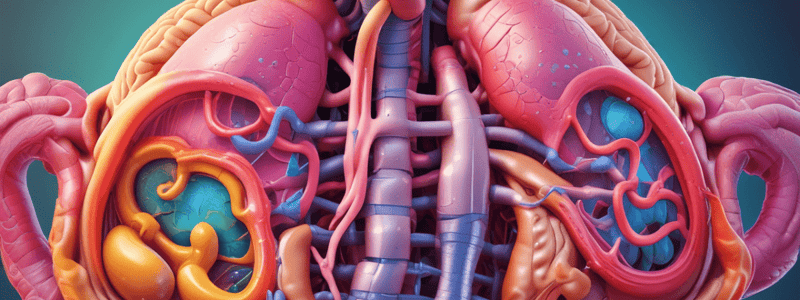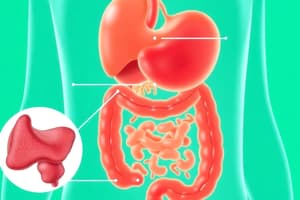Podcast
Questions and Answers
What is the main function of the oral cavity?
What is the main function of the oral cavity?
- Mechanical and chemical digestion (correct)
- Nutrient absorption
- Elimination of wastes
- Peristalsis
Which process involves breaking down ingested materials into smaller pieces?
Which process involves breaking down ingested materials into smaller pieces?
- Absorption
- Peristalsis
- Secretion
- Mastication (correct)
What type of epithelium lines the oral cavity?
What type of epithelium lines the oral cavity?
- Pseudostratified columnar epithelium
- Simple squamous epithelium
- Ciliated columnar epithelium
- Nonkeratinized stratified squamous epithelium (correct)
Which structure separates the space between the cheek or lips and gum?
Which structure separates the space between the cheek or lips and gum?
What are the main components of saliva in the oral cavity?
What are the main components of saliva in the oral cavity?
What is the function of buccinator muscles in the oral cavity?
What is the function of buccinator muscles in the oral cavity?
Which part of the oral cavity is covered externally by skin?
Which part of the oral cavity is covered externally by skin?
What is the primary role of the hard palate in the oral cavity?
What is the primary role of the hard palate in the oral cavity?
What is the function of the myenteric nerve plexus?
What is the function of the myenteric nerve plexus?
Which layer of the gastrointestinal (GI) tract consists of smooth muscle with circular and longitudinal fibers?
Which layer of the gastrointestinal (GI) tract consists of smooth muscle with circular and longitudinal fibers?
What is the composition of the serosa layer of the GI tract?
What is the composition of the serosa layer of the GI tract?
Which nerve plexus is responsible for regulating movements of the mucosa and vasoconstriction of blood vessels?
Which nerve plexus is responsible for regulating movements of the mucosa and vasoconstriction of blood vessels?
What is the primary function of the esophagus?
What is the primary function of the esophagus?
Where is the superior esophageal sphincter located?
Where is the superior esophageal sphincter located?
Which layer of the GI tract provides protection and support to the organs?
Which layer of the GI tract provides protection and support to the organs?
What is lubricated by mucus secreted by esophageal glands?
What is lubricated by mucus secreted by esophageal glands?
What is the function of the lingual frenulum?
What is the function of the lingual frenulum?
Which salivary gland is located beneath the tongue?
Which salivary gland is located beneath the tongue?
What is the primary ingredient of saliva?
What is the primary ingredient of saliva?
Where are the transverse palatine folds located and what is their function?
Where are the transverse palatine folds located and what is their function?
Which structure prevents ingested material from entering the nasal region?
Which structure prevents ingested material from entering the nasal region?
What is the function of superior labial frenulum?
What is the function of superior labial frenulum?
What is the role of intrinsic muscles of the tongue?
What is the role of intrinsic muscles of the tongue?
What is one of the functions of saliva?
What is one of the functions of saliva?
Which enzyme in the stomach is responsible for digesting proteins?
Which enzyme in the stomach is responsible for digesting proteins?
What is the main function of the lower esophageal sphincter (LES)?
What is the main function of the lower esophageal sphincter (LES)?
Which part of the stomach serves as a reservoir for food before releasing it into the small intestine?
Which part of the stomach serves as a reservoir for food before releasing it into the small intestine?
What is the primary role of intrinsic factors secreted by the stomach?
What is the primary role of intrinsic factors secreted by the stomach?
Apart from HCl and pepsin, what else is commonly found in gastric juice?
Apart from HCl and pepsin, what else is commonly found in gastric juice?
Which enzyme is responsible for digesting triglycerides in the stomach?
Which enzyme is responsible for digesting triglycerides in the stomach?
What is the shape of the stomach that aids in its function as a holding reservoir and mixing area?
What is the shape of the stomach that aids in its function as a holding reservoir and mixing area?
Which region of the stomach serves as the entryway into the stomach lumen from the esophagus?
Which region of the stomach serves as the entryway into the stomach lumen from the esophagus?
What is the main function of the pyloric part of the stomach?
What is the main function of the pyloric part of the stomach?
Which type of cells secrete mucin to prevent ulceration of the stomach lining?
Which type of cells secrete mucin to prevent ulceration of the stomach lining?
What is the function of neck mucous cells in the stomach?
What is the function of neck mucous cells in the stomach?
Which cells in the stomach assist in B12 absorption?
Which cells in the stomach assist in B12 absorption?
What is the role of the pyloric sphincter in the digestive system?
What is the role of the pyloric sphincter in the digestive system?
In what way does HCl acid secreted by parietal cells aid in digestion?
In what way does HCl acid secreted by parietal cells aid in digestion?
What is the main function of chief cells in the stomach?
What is the main function of chief cells in the stomach?
Which part of the stomach is lined by simple columnar epithelium?
Which part of the stomach is lined by simple columnar epithelium?
What is the function of enteroendocrine cells in the stomach?
What is the function of enteroendocrine cells in the stomach?
Which part of the stomach allows it to expand greatly when filled and return to its normal shape when empty?
Which part of the stomach allows it to expand greatly when filled and return to its normal shape when empty?
Flashcards are hidden until you start studying
Study Notes
Layers of the GI Tract
- The GI tract consists of four layers: mucosa, submucosa, muscularis, and adventitia/serosa
- Mucosa: lining of the GI tract, contains epithelium, lamina propria, and muscularis mucosae
- Submucosa: contains blood vessels, lymphatic vessels, and nerves
- Muscularis: consists of two types of smooth muscle: inner circular and outer longitudinal fibers
- Adventitia/Serosa: outermost layer, provides protection and support, composed of areolar connective tissue, elastic and collagen fibers, and simple squamous epithelium (mesothelium)
Functions of the Esophagus
- The esophagus is a 25 cm long, muscular tube that lies posterior to the trachea
- It extends from the pharynx to the stomach
- Purpose: secretes mucus and transports food into the stomach
- Superior esophageal sphincter (UES) and esophageal hiatus connect the esophagus to the stomach
- Peristalsis: forces materials to move further along the tract
Functions of the Digestive System
- 7 functions: secretion, digestion, absorption, circulation, elimination of wastes, peristalsis, and regulation
- Secretion: acids, bile, mucus, and digestive enzymes (7 L/day)
- Digestion: mechanical and chemical breakdown of food into smaller molecules
- Absorption: nutrients, ions, and fluids into the bloodstream
- Elimination of wastes: removal of metabolic wastes
Oral Cavity
- Initial site of mechanical and chemical digestion
- Formed by lips, cheeks, hard and soft palates, and tongue
- Covered externally by skin and internally by a mucous membrane
- Buccinator muscles and connective tissue lie between the skin and mucous membranes of the cheeks
Structures of the Mouth
- Vestibule: space between the cheeks (lips) and the gums
- Oral cavity proper: lies between the mandible and maxillae
- Uvula: together with the soft palate, they prevent ingested material from entering the nasal region
- Fauces: opening between the oral cavity and the oropharynx
- Transverse palatine folds: assist the tongue in manipulating ingested materials prior to swallowing
- Superior labial frenulum: attaches the internal surfaces of the superior lips to the gingivae
Tongue
- Accessory digestive organ composed of skeletal muscle covered with mucous membrane (stratified squamous epithelium)
- Functions: manipulation of food, mixing with saliva, converting food into a bolus, and assisting in swallowing
- Extrinsic and intrinsic skeletal muscles move the tongue
Salivary Glands
- Produce and secrete saliva into the oral cavity (1.0-1.5 liters/day)
- Functions: moistens ingested materials, cleanses and lubricates the oral cavity, begins chemical digestion of carbohydrates with amylase, and has antibacterial action with lysozyme
Stomach
- J-shaped, muscular sac that lies inferior to the diaphragm and occupies the left upper quadrant of the abdomen
- Connects the esophagus to the duodenum
- Functions: mechanical and chemical digestion of the bolus, converts semisolid bolus to a liquid (chyme), and absorbs certain substances
- Four main regions: cardia, fundus, body, and pyloric part
- Pyloric part consists of two regions: pyloric antrum and pyloric canal
- Rugae: mucosal folds that allow the stomach to expand greatly when it fills and then return to its normal J shape when it empties
Studying That Suits You
Use AI to generate personalized quizzes and flashcards to suit your learning preferences.




